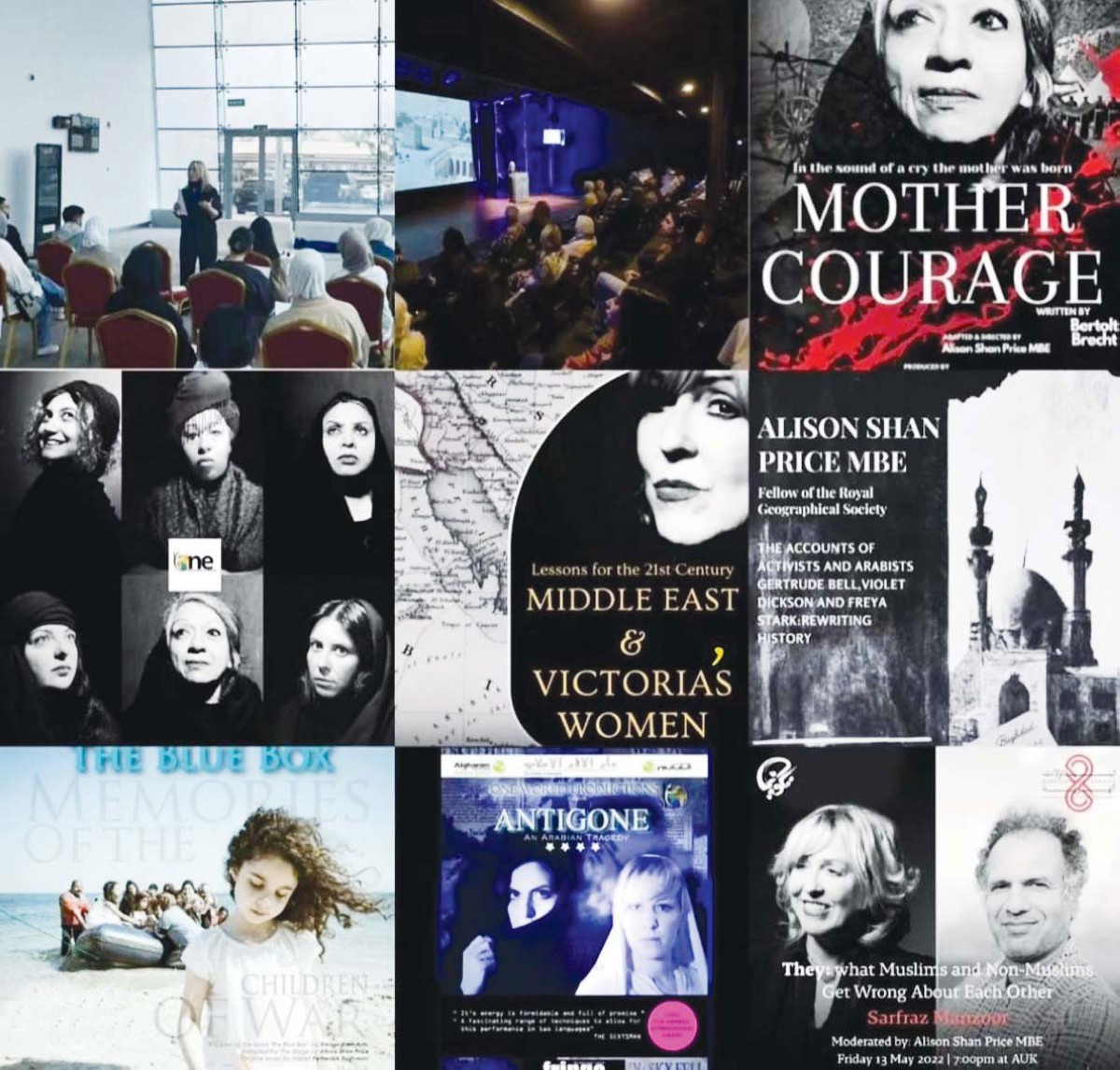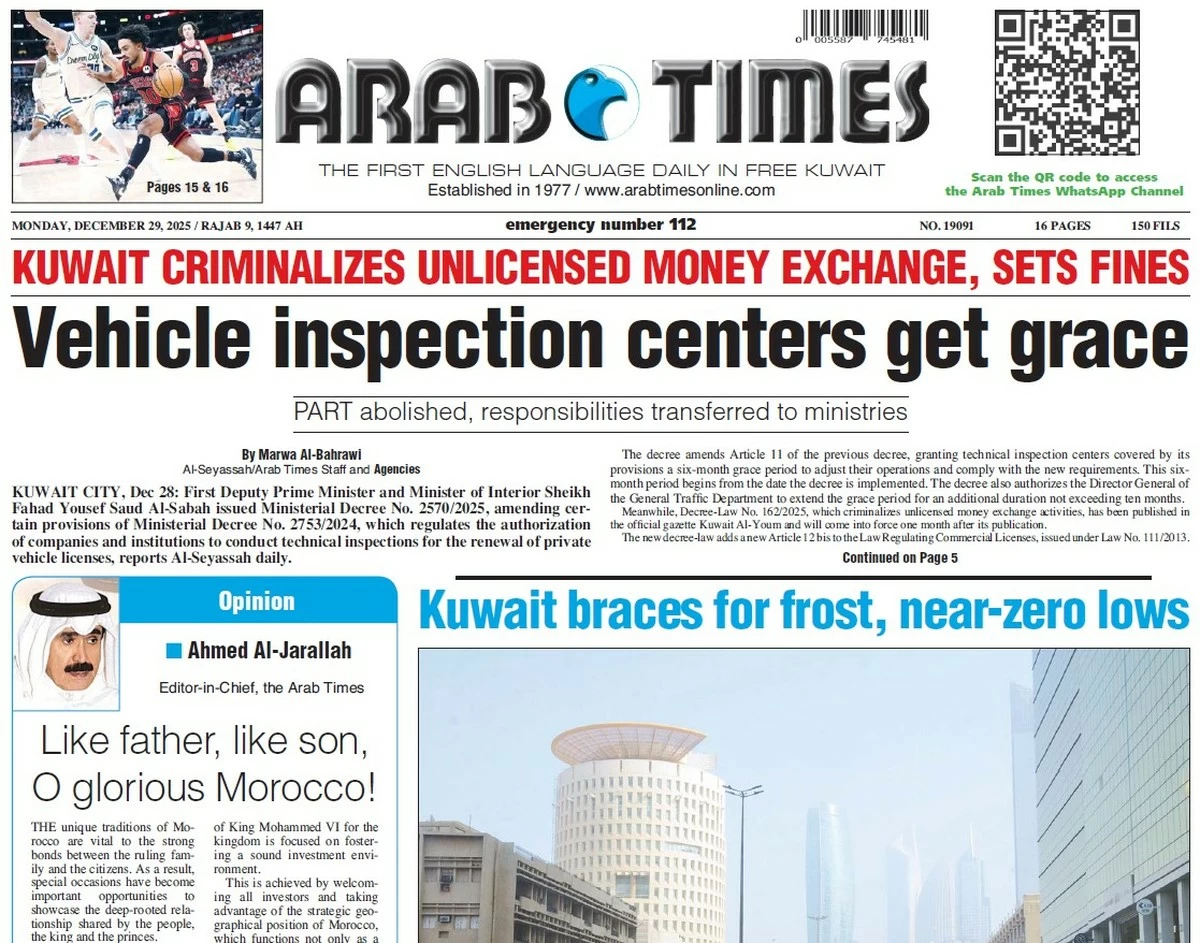07/09/2024
07/09/2024
KUWAIT CITY, Sept 7: Alison Shan Price MBE, a British woman in Kuwait, has relocated to Britain after 40 years, leaving behind an extraordinary body of theatrical work and promises of new beginnings that will continue to shed new light on the Middle East – British relationship. For more than four decades, Alison has significantly impacted Kuwait’s cultural landscape through her work in theatre, mentoring local talent, and recently through her academic research on Victorian women in the Middle East.

Her contributions include founding the KAST drama school in 1999, which evolved into the One World Actors Center in 2012, establishing the Lamda examinations in Kuwait, and providing professional qualifications to many local talents. She has trained hundreds of Kuwaiti and international students and produced notable productions like “Antigone” at the Edinburgh Festival Fringe. Some of her mentees, like Hamad Al Jenaie, have launched their own theatre companies that will continue to enrich Kuwait’s cultural landscape.
Over the years, she has brought Kuwait into the professional ambit of luminaries like Adam Darius and Dame Judy Dench. Her collaboration with another Briton in Kuwait, Harriet Bushman, has led to some extraordinary productions.Alison Shan Price received an MBE for her numerous contributions to English theatre in Kuwait.
Post-COVID, Alison’s professional graph evolved when she became a notable presence in the cultural calendar of Dar Al Athar Al Islamiyyah, where she has given several enlightening lectures. In the last two decades, I have known her as a journalist. I have seen her immersed in the theatrical arts, which have made an indelible imprint on Kuwait’s cultural landscape. Her influence on the growth of theatre, especially English theatre, in Kuwait and her mentoring of local talent will be remembered for a long time.
As she returns to the UK to pursue her PhD at Newcastle University, Arab Times looks back at her contribution and legacy. “Coming to Kuwait made it all happen,” says Alison, “and the support I’ve got from Kuwait has been amazing, something I’d never imagined would have happened in Britain.” Alison began her professional life with theatre because her parents were into theatre before she moved to physics. “I thought I’d probably go through with physics the rest of my life. But after I married John, a chemist, we decided to come to Kuwait as soon as we were married for adventure, a little bit of fun, and stayed for 40 years.”
Alison’s husband, John Price, is a noted educationist with a legacy in education in Kuwait. When Alison saw that there was not much for her children to do in Kuwait in terms of entertainment in the 1980s, she started hosting theme parties for them and their friends. “Suddenly, I realized around 50 children were coming to the parties, as the students kept inviting all their friends,” she recalls. The success of theme parties for children led to the founding of the first drama school, KAST, in 1999. “My parents, who were into theatre, came to Kuwait to give the school more structure.” KAST continued to operate until 2007, when Vera Al Muttawa of the British School of Kuwait approached Alison to become one of the directors of the British Academy of International Arts. By then, Alison had already introduced LAMDA, a pioneering British conservatoire offering industry-leading vocational training in acting, directing, musical theatre, and production and technical arts in Kuwait.
“I have always believed that if you’re going to go down a path, you have to get qualifications, certainly as a woman, because otherwise, it is a marvelous hobby,” she says. “ Therefore, I studied with LAMDA, received an associate acting diploma, and became its International Representative. I was then able to start up examinations officially.” The involvement of experts from around the world in KAST and LAMDA contributed to the development of theatre and talent in Kuwait.A significant number of students passed LAMDA, with many taking multiple examinations. Hamad Al Jenaie is a talent that Alison mentored and nurtured for 18 years.
“Hamad has now opened his own company, ACT Media, a wonderful organization that has staged its first production, Macbeth, which was a roaring success.” She says of future pans, “Hamad will handle LAMDA in Kuwait, and I am available online. Whenever I come back, I will do workshops. Hamad will also do workshops and ensure the students will continue to be trained.”
Interestingly, the person Alison mentored and guided for almost two decades will now be an active collaborator. That is just one of the footprints Alison will leave behind in Kuwait. “It is an honor because Hamad is an exceptional talent,” says Alison. “He thinks outside the box. And I realized in him the same energy and excitement I had many years ago for the subject. He has excelled in ways I could not imagine.”
In 2012, Alison founded the One World Actors Center (OWAC), a UK-registered company in Kuwait. As a UK-based company, One World obtained the licenses for Evita and Sweeney Todd and presented at the Edinburgh Fringe. Over the years, OWAC has produced and presented several groundbreaking shows, including Story of Ibn Haytham, The Little Princess, A Night at the West End, Blue Box, Antigone: An Arabian Tragedy, The Lion in Winter, Mother Courage, and many other productions, all of them remarkable examples of multicultural collaborations. It is not easy to sustain any form of performing arts in Kuwait. Corporate support is negligible, and selling tickets is a nightmare. The only things keeping the art scene alive in Kuwait is government patronage and support from organizations like Dar Al Athar Al Islamiyyah. “It’s not just theatre. Any performing arts in Kuwait or any other country requires support from corporations and individuals. This is important because you can’t put a show on without funding.” Alison speaks warmly of the support she has received from organizations like Dar AL Athar Al Islamiyyah and the National Council for Culture, Arts and Letters. “We have always started with zero budget,” she laughs. “We made it happen with help from Dar Al Athar Al Islamiyyah, Mr Sayed, our technical coordinator, friends from KAMCO and Wiz. It would be best if you built relationships. You need to understand that you can’t do your show without them. It is a fusion of multiculturalism that helps and supports talent.” In 2016, Alison Shan Price received an MBE from the late Queen for her contribution to theatrical arts in Kuwait and the Middle East. “It was an honor,” says Alison.
“It was an honor to be nominated in the first place. It is only then you realize that people have to send in testimonials from all over the world.” The recognition was based on Alison’s work with LAMDA, the One World Actors Centre, and the Edinburgh Festival Fringe. “It made me realize that the work we are doing in Kuwait is worth it,” she recalls. “It was a wonderful moment.” It was Alison’s collaboration with noted theatre personality Huda Shawa that started her on her journey with history and academia. “It has been an adventure because I had my original degree in physics. I never thought I’d go into history.
Huda Shawa asked me to perform the role of Freya Stark, who came to Kuwait in 1933 and 1937. I knew nothing about Freya. Why didn’t I, a British woman, know about her?” When Alison mentioned on social media that she would perform the role of Freya Stark, someone on Instagram directed her to the existence of 5000 photographs in the Middle East Center of St Anthony’s College in Oxford. That comment prompted Alison to contact Oxford for access to the archives and thus began her research on Victorian women in the Middle East.“My research into their lives shows that they were women of our times, not women of their times. They were liberal, new, independent women who traveled through the Middle East. They spoke Arabic and understood the problems everybody was going through in the region.”
Alison’s research led her to do her Postgraduate studies and join the cultural season of Dar Al Athar Al Islamiyyah as a lecturer. It also led her to do her ongoing PhD at Newcastle University. This year, she has been invited to give a talk at Raleigh House at Oxford University in October.Alison Shan Price MBE has had a very successful and productive forty years in Kuwait. As she marks out new milestones for her onward professional journey, her legacy in Kuwait will continue through her students, future collaborations, memories of her productions in Kuwait, and research work and lectures.
By Chaitali B. Roy
Special to the Arab Times


